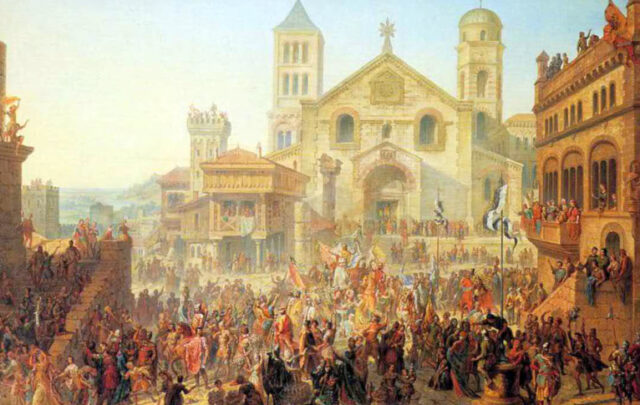[Cross-posted to DSA’s Religious Socialism blog; parts of this post were previous published here.]
When The New Republic ran its package of articles on “The Socialist Moment” back in May, its cover art used Senator Bernie Sanders and Representative Alexandria Ocasio-Cortez to invoke the fictitious couple famously portrayed in Grant Wood’s “American Gothic,” almost surely solely for humorous reasons. But there is something to be said, I think, for why that juxtaposition seems humorous. Part of it is almost certainly that Wood’s painting is tied in our collective popular consciousness with a homeliness and a particular kind of conservative Americana. And, of course, socialism in America is not so coded. Rather, “socialism” is understood as radical and cosmopolitan–not the sort of thing that can be reasonably associated with older, church-attending farming couples, right?
Let me suggest otherwise. Democratic socialism is, I think, at least potentially compatible with, and perhaps even capable of drawing strength from, the small towns and churches of U.S. society.
One reason to make this argument is to respond to false assumptions made by those who might otherwise be sympathetic to socialist principles. The two somewhat critical pieces included in the New Republic package are examples. Both Robert Westbrook and Win McCormick recognize the way that the extreme inequality of capitalist societies today threatens the basic freedoms that democracies require to function. But both are suspicious of democratic socialism’s ability to deliver a certain type of positive economic freedom without also squelching the diversity and plurality that characterize truly free societies. Instead of democratic socialism, they turn to the social democratic ideal of “property-owning democracy” advocated by John Rawls, or to the civic republican ideal of an economy firmly subjected to a communally (and thus culturally) articulated common good. In both cases, these writers are looking to push against oligarchic wealth in the name of defending the power and liberty of persons, institutions, and communities.
Democratic socialism, to their mind, rightly opposes capitalism, but does not take pluralism seriously.
There is some basis for that fear. After all, when you see self-described socialists like Sanders speak out on behalf of Medicare for All and other universal programs, you might question what, if any, space is left for distinct groups of people who want to do things—even socially just things—in their own communally-articulated way. (The debate over whether a justly socialized and democratized health care system would still allow for private medical providers or private health insurance programs is just one example of this.) Westbrook and McCormick are not alone in thinking that many socialists have answered that question with a much-too-casual “none” in the past. But other—I think better—socialist thinkers have long recognized the failures of doctrinaire Marxism and instead insisted upon the “primacy of politics.” In Sheri Berman words, this means acknowledging the place of a pluralistic, localized civil society in the overall socialist order and for real democratic debate and diversity within it. It means abandoning the dream of a perfect, rationally-unfolding socialist moment in favor of what Michael Walzer called an always contested “socialism-in-the-making.”
We serve socialism poorly by failing to recognize how much of the opposition of conservative people, rural people, and most particularly church-going people to democratic socialism is the result of the sense that there would be no space under the socialist order for their communities and traditions. Given that many of those traditional beliefs and local practices are inegalitarian or exclusionary, why should we take their fears seriously? Well, perhaps because, when properly understood, at least a few of their fears are similar to our own. For example, some conservative thinkers recognize that what most threatens their familial and traditional aspirations isn’t the promise of democratic liberation and socialist equality; rather, it is the homogenizing individualism and consumerism of our corporation-dominated world. As Alan Jacobs, one such conservative, put it: “What [we traditional Christians] are battling against isn’t a form of socialism….I would argue rather that it’s the ultimate extension of the free market—a kind of metaphysical capitalism. The gospel of the present moment is…’I am my own.’ I am a commodity owned solely by myself; I may do with this property whatever I want and call it whatever I want.” This libertarian attitude, however much it may sometimes seem compatible with the freedom that democratic socialism delivers, is, I think, one that anyone who takes genuine social liberation seriously cannot accept. Thus in at least a few small ways, socialists and certain conservative thinkers may be said to occupy a similar space.
I am not suggesting some grand communitarian-traditionalist-socialist alliance here, at least not without a great deal of careful theoretical exploration and clear limitations (some of which I’ve attempted in the past, under the title “left conservatism”). However, I am insisting that advocates of democratic socialism hurt themselves in the realm of political debate, and misunderstand themselves in the realm of ideas, when they present socialism as too universal, and too rational, to ever be republican in the classic sense: that is, attentive to the res publica, to people where they live. Economically, that’s a silly argument: democratic socialism is about freeing people from the social power that prevents them from being able to make the choices and live the places and maintain the ways of life that they choose and love. But structurally and morally, the question remains. Will socialism allow for local democracy, even if that local democracy reflects the belief systems of local, perhaps traditional, perhaps religious majorities? That’s a hard question. It is easy for socialists to see the value of church communities that are purposively engaged in social justice; it is less easy for us to acknowledge that the social empowerment of people, their liberation from economic tyranny, is a good thing itself, even if the resulting political and moral choices of those of faith don’t match the egalitarian ideal. To quote Michael Walzer again:
The true home of socialism-in-the-making isn’t the government; it is the political space that exists outside the government….The space is always contested, and the locus of the contests is civil society. Civil society is, like the state itself, a realm of inequality, where the powerful get more powerful and the rich get richer. Every civil association, every organized group of men and women, is also a mobilization of resources….This is an obvious story, but it isn’t the whole story. Civil society is simultaneously a realm of opportunity for democratic and egalitarian activists….More than half a century ago, the British social theorist A.D. Lindsay described the “dissenting” Protestant congregations of 18th- and 19th-century Britain as schools for democracy. They were that, but they had intrinsic as well as instrumental value–and that is true today of all the associations of civil society that engage the energy and idealism of their members.
Note that this isn’t an argument that civil bodies, once truly socially empowered, wouldn’t be or shouldn’t be changed by being more thoroughly economically integrated with the rest of society. They would be, and they should be—the most obvious reason for which being that no social organization, churches included, can ever, or should ever, fully go at their participatory tasks alone. And so the community group or faith organization that seeks its own approach to addressing social problems—housing the sick, treating the addicted, protecting the weak, listening to the ill—will be part of the larger network of other groups, large and small, doing the same thing, and such networks would profoundly—and democratically—shape practices and beliefs over time. But still, a recognition of the intrinsic value of what every church congregation, every faith-based community, every local or traditional body does when they become of part of socialism-in-the-making suggests that democratic socialism, unlike late capitalism, won’t fundamentally homogenize all variety out of social life.
So, does that mean that a community, church, and local property-respecting socialism will be a patchwork, filled with distinctions and differences from one place to the next? Within limits, probably yes. Indeed, I’m not sure how one can admit that political debates will still exist under socialism and not admit to such actual public or regional or faith-based diversity. Those socialists who would restrict diversity solely to a specific set of identities and deny that social equality can accommodate religious or cultural or spatial diversity as well are, I fear, failing to understand the place of what could be—and historically often have been—one of our strongest potential allies in keeping anti-capitalist and genuinely social and egalitarian values alive.
Back in January, Erik Olin Wright, a brilliant and profoundly original socialist thinker, writer, and organizer passed away. His book Envisioning Real Utopias had an enormous impact upon me; when I first read it, I found myself explaining and re-explaining its ideas to myself and everyone I met for months. The most important thing it did was explain how the Marxist shadow over socialist and all other forms of utopian thinking has too often kept thinkers on the left from recognizing the obvious: that what we want to do is empower civil society. That is, we are looking to make the mutual support that communities provide stronger, and to make our social and economic worlds more democratic. Hence we leftists need to be guided, first and foremost, by a “socialist compass,” and we need to recognize everything that falls within that compass, including what he called “interstitial” entities and strategies—what a non-sociologist might call the thousands of initiatives and organizations which provide spaces wherein civil society, and not capital, rules. He acknowledged that the more doctrinaire Marxist thinkers would see these as a distraction from the longed-for revolution, but insisted that their emancipatory potential is nonetheless real. And as for those civil associations that strengthen community and provide shelter from the hyper-individualism of liberal capitalism through particularist, sometimes exclusionary, religious means? Should the Salvation Army’s gift drives or the Catholic church’s drug treatment centers, both of which have socially empowered and shared wealth many hundreds of thousands, be crushed by the rationalizing and centralizing Red Guards of some new socialist state? Well…no. As Wright explained:
A vibrant civil society is precisely one with a multitude of heterogeneous associations, networks, and communities, built around different goals, with different kinds of members based on different sorts of solidarities….It is tempting to deal with this…by somehow defining civil society as only consisting of benign associations that are consistent with socialist ideals of democratic egalitarianism….I think this is an undesirable response….There is no guarantee that a society within which real power rooted in civil society predominates would be one that always upholds democratic egalitarian ideals. This, however, is not some unique problem for socialism; it is a characteristic of democratic institutions in general. As conservatives often point out, inherent in democracy is the potential for the tyranny of the majority, and yet in practice liberal democracies have been fairly successful at creating institutions that protect both individual rights and the interests of minorities. A socialist democracy rooted in social empowerment through associations in civil society would face similar challenges…My assumption here is not that a socialism of social empowerment will inevitably successfully meet this challenge, but that moving along the pathways of social empowerment will provide a more favorable terrain on which to struggle for these ideals than does either capitalism or statism (Envisioning Real Utopias, pp. 145-148).
I can imagine many socialists seeing the foregoing as a lot of murky meanderings. I find it beautiful: an olive branch to everyone who wants civil bonds to flourish, equal respect to increase, and communities to be strengthened. To voice such egalitarian goals in terms of community strength and stability might seem scarily traditional to some advocates of the socialist cause. They—we—should get over that fear. Democratic socialism, whatever else it is or could be, needs to be about taking root and building up a sense of equality and justice in particular places, through the beliefs and practices of particular people. Would that mean granting churches and communities that preach white supremacy or the prosperity gospel or conversion therapy or any other deeply unjust and unequal message the freedom to dominate others? Certainly not! But admittedly, distinguishing between churches and communities whose local empowerment has crossed the line into oppression (for example, a self-sustaining Amish farming community which declines to participate in a national health service on the one hand, an immigrant association that teaches female genital mutilation in its new parent classes on another) will not always be easy, or without the need for constant reconsideration as times and needs change. If, however, democratic socialists truly do wish to acknowledge the plurality of those human desires that real equality and respect will allow, working to find a way to make the most of the best which particularist communities and their believers can offer is necessary. And not only necessary, but beneficial, as the richness of civil society is, I strongly suspect, much more ennobling than many socialists may expect.





